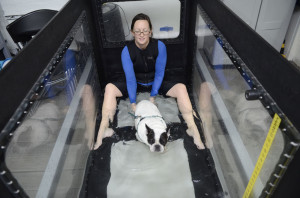Although hydrotherapy has been a treatment option for the last two decades, it has only been recently (the past five years or so), that it has dramatically increased in popularity. But, with most things that become trendy, there are many unscrupulous people out to make a quick buck on the unsuspecting public. Unknowing owners can spend hundreds of dollars on treatment from someone who is not actually qualified, which may end up causing further harm to your dog.
Jonathan S. Block, DVM CVA CCRT and Veterinary Medical Director at Water4Dogs, a canine rehabilitation center in New York City, answered our questions to make sure your dog is getting hydrotherapy from the right source.
What is hydrotherapy used to treat in dogs?
Typically, it is great for rehabilitation and prevention of orthopedic and neurological diseases. Examples of some orthopedic conditions that are commonly treated include osteoarthritis; hip/elbow dysplasia; and recovering from sports injuries or orthopedic surgeries like cruciate ligament tears. Examples of neurological diseases that are commonly treated with hydrotherapy include compressive spinal cord diseases; injuries like inter-vertebral disc disease; or degenerative diseases like Degenerative Myelopathy (similar to ALS).

There are several reports that suggests rehabilitation (including hydrotherapy) improves recovery time for orthopedic surgeries and is an effective component of non-surgical management of orthopedic diseases like hip dysplasia.
Who can perform hydrotherapy treatments?
Canine Hydrotherapy is generally performed in a veterinary clinic or a certified veterinary rehabilitation center. In order to perform hydrotherapy, an individual should be (or in the process of becoming) certified in Canine Rehabilitation. This certification is limited to licensed Veterinarians, licensed Human Physical Therapists(PT), licensed PT assistants, and licensed Veterinary Technicians. Often times, veterinarians and physical therapists will develop and oversee the treatment plans, and the PT assistants and vet techs will perform the therapy.
Is there a governing body here in the US that regulates?
We have The American Association of Rehabilitation Veterinarians. In addition, there are only two training programs in the US that certify qualified individuals in Canine Rehabilitation, The Canine Rehabilitation Institute (CRI) and The University of Tennessee College of Veterinary Medicine. Both of these programs strictly screen their applicants and will only admit those with the aforementioned licenses into the training programs. This serves as safeguard and aims to elevate the standards of care in the canine rehabilitation setting.
What should dog owners look for when selecting someone to do hydrotherapy on their dog?
Owners should make sure that anyone offering this service has been certified as a canine rehabilitation therapists or practitioner. Many veterinary clinics are starting to offer underwater treadmill therapies but do not necessarily have trained rehabilitation therapists to perform these treatments.
Any red flags that they should be aware of?
There are always contraindications for all types of therapies. The big health contraindications for hydrotherapy are if patients have diseases of the cardiovascular system like congestive heart failure or diseases that may inhibit their ability to breathe properly like laryngeal paralysis or collapsing trachea.
Another red flag to look for is someone who might be offering hydrotherapy but not trained in canine rehabilitation.
The Bottom Line
Hydrotherapy can be a great addition to your dog’s treatment – whether recovering from surgery or easing arthritis pain. However, you must do your homework and make sure you are working with a certified canine rehabilitation vet, or your dog may end up worse off. If you are unsure, contact The American Association of Rehabilitation Veterinarians for help locating a certified vet near you.
About the Author
Based in Wilsonville, Ore., animal lover Kristina N. Lotz is a Certified Professional Dog Trainer – Knowledge Assessed (CPDT-KA) and works as a full time trainer. She is the founder of, A Fairytail House, a unique all-positive all-sport dog training facility that helps rescue dogs in her area and provides free seminars and training classes for the community. In her spare time, she trains and competes in herding, agility, obedience, rally, and conformation with her Shetland Sheepdogs. She smartly married a Veterinary Technician, who helps keep the fur kids happy and healthy, and provides a quick resource for articles.
